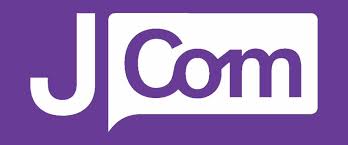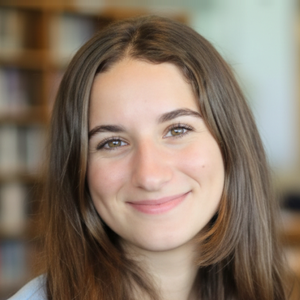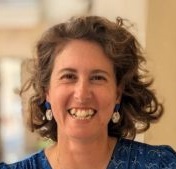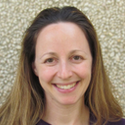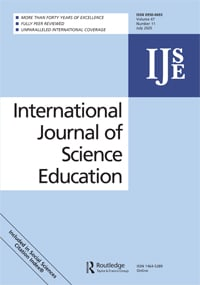-
13 Oct 2025 • Journal Article • Journal of Science Communication
How does social-media-based science communication affect young audiences? A scoping review of impact making
AbstractWhile social media has been praised for youth engagement with science, evidence of its impacts remains fragmented. This scoping review reports on the impacts of social-media-based science communication on young audiences. A PRISMA-guided database search yielded 2,257 articles, which were screened to include only empirical articles studying social
… show more -
2 Jul 2025 • Journal Article • International Journal of Science Education
Empirically testing a shared assumption: the usefulness of science education to science-informed decision-making in the context of COVID-19
AbstractThe claim that science education is useful for people’s everyday engagement with science is often repeated but has little evidence. In an attempt to empirically test this shared assumption, we examined whether the level of science education people received predicted indicators of science-informed decision-making: adherence to experts’ recommendations, using science to
… show more -
24 Jun 2025 • Journal Article • Science Education
The Importance of Science Education, Scientific Knowledge, and Evaluation Strategies for the Successful Detection of COVID-19 Misinformation
AbstractAn important goal of science education is to equip students with the scientific knowledge and evaluation skills necessary to identify misinformation. However, the specific role of science education and knowledge and the evaluation strategies most commonly relied on in this process remain unclear. The two studies presented here leverage educational diversity to explore
… show more -
11 Jun 2025 • Journal Article • Science Communication
Generative AI in Science Communication: Fostering Scientists' Good Working Habits for Ethical and Effective Use
AbstractScientists increasingly use generative artificial intelligence (GenAI) to aid in science communication tasks due to limited time and resources. GenAI can function as a writing assistant, idea generator, or collaborative tool. While it offers promising support, it is crucial to address potential pitfalls, such as misinformation due to its stochastic nature, dependency
… show more -
May 2025 • Journal Article • Journal of Research in Science Teaching
Deciphering the role of epistemic injustice in school-based citizen science: Sources, implications, and possible ways for mitigation
AbstractParticipation in citizen science, a research approach in which nonscientists take part in performing research, is a growing practice in schools. A main premise in school-based citizen science is that through their participation, students and teachers make meaningful contributions to the advancement of science. However, such initiatives may encounter difficulties in
… show more -
14 Apr 2025 • Journal Article • Journal of Science Communication
Exploring temporal and cross-national patterns: The use of generative AI in science-related information retrieval across seven countries
AbstractThis study explores the role of ChatGPT in science-related information retrieval, building on research conducted in 2023. Drawing on online survey data from seven countries—Australia, Denmark, Germany, Israel, South Korea, Taiwan, and the United States—and two data collection points (2023 and 2024), the study highlights ChatGPT’s growing role as an information intermediary
… show more -
Mar 2025 • Journal Article • Journal of Research in Science Teaching
People who have more science education rely less on misinformation—Even if they do not necessarily follow the health recommendations
AbstractRecent research has highlighted the role of science education in reducing beliefs in science-related misinformation and stressed its potential positive impact on decision-making and behavior. This study implemented the Elaboration Likelihood Model to explore how individuals' abilities and motivation interact with the type of processing of scientific information in the
… show more -
Feb 2025 • Journal Article • International Journal of Science Education, Part B
Justifying decision making in socio-scientific issues: the roles of reasoning and knowledge
AbstractIn the recent decade, the proliferation of ICTs that require Wi-Fi routers in schools has been accompanied by public concerns about risks fueled in many cases by media reporting. The current study examines ways in which parents of school-age children perceive the issue of Wi-Fi radiation in schools by using a science literacy framework that examined engagement with
… show more -
31 Jan 2025 • Journal Article • Public Understanding of Science
The perception and use of generative AI for science-related information search: Insights from a cross-national study
AbstractPublicly accessible large language models like ChatGPT are emerging as novel information intermediaries, enabling easy access to a wide range of science-related information. This study presents survey data from seven countries (N = 4320) obtained in July and August 2023, focusing on the perception and use of GenAI for science-related information search. Despite the
… show more -
Jan 2025 • Journal Article • Public Understanding of Science
Cognitive, affective, and behavioral engagement with science news predicted by the use of accessibility strategies in science-minded and general audiences
AbstractNumerous studies have explored internal factors such as cultural values and acquired knowledge accounting for how people engage with science. However, it remains unclear how external factors embedded in science texts relate to audience engagement. A content analysis of 298 text-based popular science news articles and their following 5852 reader comments was conducted
… show more
